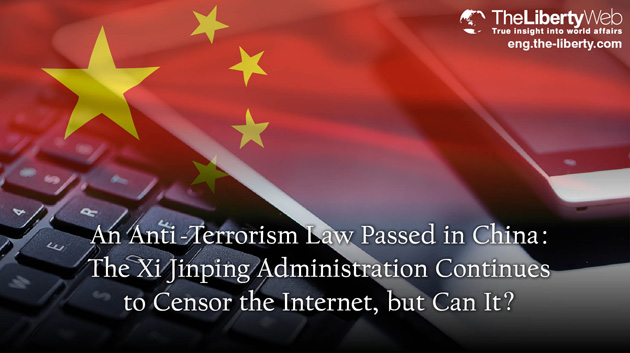An Anti-Terrorism Law Passed in China: The Xi Jinping Administration Continues to Censor the Internet, but Can It?
An Anti-Terrorism Law was passed with a unanimous vote in a Standing Committee held in China on December 27th, 2015, which took effect on January 1st, 2016.
Anger over Information Censorship Is on the Rise
The Anti-Terrorism Law states that all IT companies in China must send any unclassified user information, such as passwords, to the government.
This will, of course, affect overseas companies that are functioning in China, and the U.S. government has criticized the system, saying that freedom of speech and religion are limited in China, and now information security on servers is about to be lost.
The Anti-Terrorism Law also allows the People’s Liberation Army to undertake anti-terrorism operations overseas, but does not allow the publishing of detailed reports on terrorist attacks that have the potential to be copied elsewhere. There is much anxiety spreading amongst the people regarding information censorship becoming tighter in this way.
Xi Jinping Wants to Use the Internet to Spread His Administration
Internet censorship has continued to tighten since the inauguration of the Xi Jinping Administration. If the government is able to control the web, it can use the Internet for government propaganda. If it can’t, the web will only become a threat to Xi’s administration. Thus, in China the Internet police immediately delete anything that is unfavorable to the government. In addition, servers such as Google, Yahoo, Facebook, Twitter, and LINE, have been removed from the Chinese Internet market, as they don’t follow China’s rules.
China Finds Potential for Economic Growth in IT
While tightening information censorship, the Chinese government has also been promoting China’s huge Internet business potential at the same time. It has even held an ‘Internet expo’ in Wuzhen.
Around 2,000 representatives from Internet-related companies gathered from around the world, making connections with Chinese IT companies such as Lenovo, Alibaba Group, Baidu, and Tencent.
Thus, China is using huge amounts of manpower to try to control the Internet through holding events to promote it, and it is also using the Internet police to censor information and to undertake operations such as simultaneous national exposure of corrupt financial dealings between IT companies. It is almost as if the government is pressing both the accelerator and the brake.
The Xi Jinping Administration Is Nearing Collapse Due to the Internet
The fact that the Xi Jinping Administration fears freedom of speech is evident because it fears Internet platforms, which allow for the freedom of speech. Innovative technology has allowed many Chinese citizens to access the Internet, so the Xi Jinping administration has been continuing to tighten its censorship.
It seems that a socialist, political ideology and a market economy suit the Chinese government, but unless freedom is ensured in business management and choice in products, a market economy will not properly function. This sort of contradictory government will, sooner or later, fall into ruin. If the democratic activists that are spread throughout the country unite via the Internet, a large-scale riot or revolution will be unavoidable.
China has come to the point where the creation of a compensatory law, such as this Anti-Terrorism Law, won’t be able to stop the seeds of the coming revolution.



















